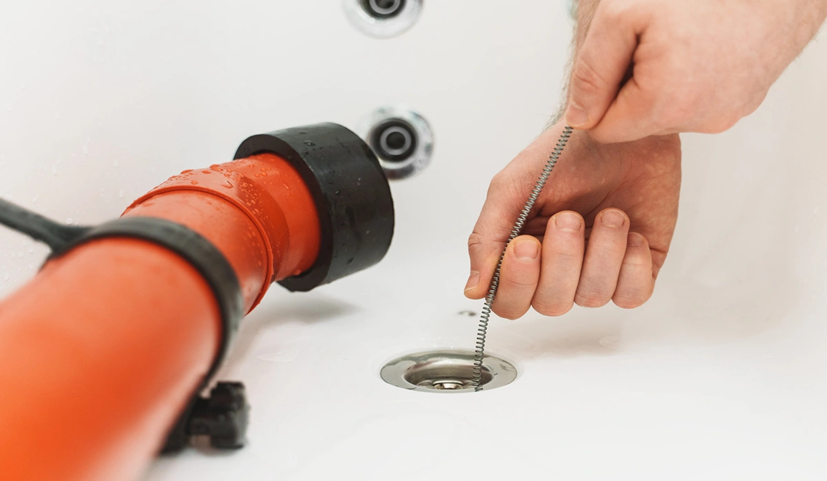When a clogged drain strikes, many homeowners might consider using a plumbing snake as a quick fix. While this tool may seem like an easy solution, it can cause more harm than good. A plumbing snake is used to remove blockages from pipes, but using it improperly can lead to significant problems.
This article discusses five reasons why you should avoid using a plumbing snake without professional help and why it's better to call a plumber.
1. Risk of Damaging Your Pipes
The main reason not to use a plumbing snake is the risk of damaging your pipes. Plumbing snakes are designed to break through clogs, but if not used properly, they can scratch or puncture the pipe's interior. The scratches can lead to rust or weakened areas that may cause leaks or even pipe bursts. If the blockage is stubborn, using a plumbing snake might worsen the situation and create a bigger problem that requires costly repairs.
Calling a professional plumber ensures that the right tools and techniques are used to clear the blockage without harming your plumbing system. A plumber will assess the severity of the clog and decide on the most effective and safe method for clearing the drain.
2. Increased Risk of DIY Plumbing Hazards
Using a plumbing snake is associated with DIY plumbing risks. If you don’t know how to use the tool, you may make mistakes that could lead to bigger plumbing issues. For example, you could accidentally push the blockage further down the pipe, making it even harder to reach. Improper handling of a plumbing snake can cause injuries when applying too much force or when the tool slips.
Trying to perform DIY plumbing tasks without proper knowledge can lead to complications. Calling a professional plumber to handle drain cleaning is always safer and more efficient, as they have the right tools and expertise to get the job done correctly.
3. Temporary Solution for a Bigger Problem
Using a plumbing snake may provide a temporary fix, but it doesn’t always address the root cause of the problem. Drain blockages can occur due to underlying issues like tree root intrusion, pipe corrosion, or accumulated debris that a plumbing snake can’t solve. In such cases, using a plumbing snake might clear the immediate blockage but won’t stop the issue from recurring.
A plumber can assess the underlying cause of the clog and offer a permanent solution. Whether it involves pipe repair, cleaning, or a more advanced procedure like hydro-jetting, professional plumbers can ensure the issue doesn’t return and that your plumbing system stays in good condition.
4. Inadequate for Complex Clogs
Not all drain clogs are simple, and many require advanced techniques to properly clear. While a plumbing snake is effective for removing hair, soap scum, and food waste, it might not be powerful enough to handle more stubborn or complicated clogs. For instance, tree roots invading the pipes or a serious buildup of grease and sludge may not be addressed with a plumbing snake.
In these cases, calling a professional plumber is essential. They have access to specialised tools like video cameras for inspecting pipes, or high-pressure water jetting systems, which are far more effective at clearing complex blockages than a plumbing snake.
5. Mess and Inconvenienc
When using a plumbing snake, there's a risk of making a mess. Plumbing snakes require you to insert the tool into your drain, which can result in water and debris spilling out of the pipe, creating a dirty, inconvenient situation. Even if the clog is cleared, you may still need to clean up the mess left behind by the snake itself
By hiring a plumber, you avoid the hassle and mess of dealing with clogged drains on your own. A professional plumber will arrive with all the necessary tools and equipment to clear the drain effectively and without making a mess.
Conclusion
While a plumbing snake may seem like an appealing DIY solution to clear a clogged drain, using it without proper knowledge can lead to damaged pipes, injuries, and only temporary relief from the problem. In many cases, the clog is a symptom of a larger issue that requires professional attention. Calling a professional plumber ensures the blockage is cleared safely and efficiently while preventing future damage to your plumbing system. In the long run, hiring an experienced plumber in Epping saves you time and money, offering peace of mind and a long-lasting solution to your plumbing problems.
FAQ
Q: 1. What is the average cost to snake a drain?
Ans: The average cost to snake a drain in Australia ranges from $100 to $300, depending on the blockage severity, the location, and whether emergency services are required.
Q: 2. Why should I call a plumber instead of DIY?
Ans: Calling a professional plumber ensures proper diagnosis, reduces the risk of damage to your pipes, and provides a long-term solution. Plumbers have the right tools, training, and experience to address complex plumbing issues safely.
Q: 3. What happens if I do my own plumbing?
Ans: Attempting DIY plumbing can lead to mistakes, damage to your pipes, and safety hazards. It’s easy to make problems worse, which can result in higher repair costs and more complicated issues.
Q: 4. When not to use a drain snake?
Ans: Avoid using a drain snake for deep or complex blockages, such as tree root intrusions or large-scale clogs caused by grease. For these issues, it's best to call a professional plumber for a proper diagnosis and effective treatment.
Q: 5. Do plumbers fix clogged drains?
Ans: Yes, plumbers specialise in fixing clogged drains. They use various tools and methods, including plumbing snakes, hydrojetting, and pipe inspections, to resolve blockages and prevent future problems.
Q: 6. How much does a plumber charge to change a tap washer?
Ans: A plumber charges between $80 and $150 to change a tap washer, depending on the location, the type of tap, and whether the job requires additional repairs.

